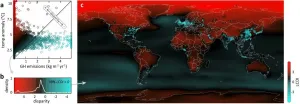Have you ever wondered how many species have inhabited the earth?
2021-07-14
(Press-News.org) Professors in Syracuse University's College of Arts and Sciences explored whether or not the scientific community will ever be able to settle on a 'total number' of species of living vertebrates, which could help with species preservation. By knowing what's out there, researchers argue that they can prioritize places and groups on which to concentrate conservation efforts.
Research professor Bruce Wilkinson and professor Linda Ivany, both from the Department of Earth and Environmental Sciences, recently co-authored a paper in the Biological Journal of the Linnean Society where they determined that forecasting the total number of species may never be possible.
When asking the question, 'how many species?,' it is important to note that only a fraction of existing species have been named. In order to make a prediction on a total number, researchers project the curve of new species descriptions each year into the future until eventually reaching a point when all species should have been found.
Wilkinson, a geologist, noticed parallels between the discovery curves of new species and the total reservoir size of nonrenewable resources like oil or mineral ores. Similar to the species curve, by extending the oil reservoir curve researchers thought they should be able to estimate the total global reservoir and how long it will take to get to it all. The theory of resource exploitation suggests that the number of discoveries over time follows a bell-shaped curve: The curve rises as production rate increases due to new discoveries and then decreases as production declines, despite all the effort continuing to go into finding the resource. The time of maximum discovery is known as Hubbert's peak, after M. King Hubbert who predicted it. Following that time, the resource is being evermore depleted until it is used up.
"The problem with using that curve to predict how much is left is that you have to assume that the effort invested and the approach used to discover new oil, or species, is consistent and known," says Wilkinson. "We used to think we'd gone over the peak for oil and gas around 1972, but then 15 or so years ago someone figured out how to do horizontal drilling and all of the sudden there was a new bump in the amount being discovered."
Wilkinson and Ivany say that the discovery curve for new species of vertebrate animals shows a similar bump. Like the increase in the oil curve caused by horizontal drilling in the early 2000s, there was a surge in new species discovery beginning around 1950, when new funding was being dedicated to science after the World War II, more scientists were going into biology, and new molecular techniques were leading to an increase in the ability to distinguish species from one another.
In both cases, unforeseen changes in the effort and method of discovering new oil or species altered the way the discovery curves were playing out.
If researchers had estimated the total number of species based on data prior to 1950, their estimates would be much different from any estimate made today, and both would likely be wrong because those new advents cannot be predicted.
In some ways, this is a reflection of the scientific method, in which hypotheses stand until new facts are discovered, which lead to changes in the hypothesis.
"As much as we'd like to know 'the number,' the total species richness of the planet will remain an elusive target," says Ivany.
INFORMATION:
Read their full paper, Estimating vertebrate biodiversity using the tempo of taxonomy - a view from Hubbert's peak, in the Biological Journal of the Linnean Society.
[Attachments] See images for this press release:

ELSE PRESS RELEASES FROM THIS DATE:
2021-07-14
PITTSBURGH, July 14, 2021 - More doesn't necessarily mean better--including in cancer treatment.
University of Pittsburgh School of Medicine and University of Wisconsin-Madison scientists report today in Science Translational Medicine that combining targeted radiopharmaceutical therapy with immunotherapy significantly boosts eradication of metastatic cancer in mice, even when the radiation is given in doses too low to destroy the cancer outright.
"We're excited--with such low doses of radiation, we didn't expect the response to be so positive," said lead author Ravi Patel, M.D., assistant professor at Pitt and radiation oncologist at UPMC Hillman Cancer Center. "In clinical trials, we tend to go with the maximum tolerable dose, ...
2021-07-14
COLUMBUS, Ohio - Facebook posts by members of the U.S. Congress reveal the depth of the partisan divide over the COVID-19 pandemic, new research shows.
A study of all 12,031 Facebook posts concerning the pandemic by members of Congress between March and October 2020 showed that Democrats generally took a more negative or neutral tone on the issue, while Republicans were more likely to have a positive tone in their posts.
Public crises, like the pandemic, highlight how central social media is to messaging and how important it is to understand how rhetoric impacts engagement and sharing of messages said Laura Moses, co-author of the study and a doctoral student in political science at The Ohio State University.
"When ...
2021-07-14
New research, led by the Monterey Bay Aquarium, illustrates the disparity between the narrow origins and far-reaching impacts of greenhouse emissions responsible for disrupting the global climate system. Published in Science Advances today, the study was built upon the most comprehensive accounting of global emissions from the burning of fossil fuels. It reveals that the regions generating the most emissions are different from those expected to suffer the most severe warming. The result of this comparison shows the fundamental disparities - quite literally putting them on the map - associated with where, and who, will experience the greatest impacts of climate change.
"One of the dirty tricks of climate change is that local pollution has far-reaching consequences," ...
2021-07-14
An analysis of the tone used in pandemic-related social media posts from U.S. Congress members over an 8-month period in 2020 finds clear partisan differences, with Democrats using a slightly negative tone compared with Republicans, who appeared to use more strongly positive language in their COVID-19 messaging. Democrats were also far more likely than Republicans to use neutral language. The study also indicates that tone plays a critical role in elite communications, finding that the public engages more with content that has a negative tone. The study authors note that messaging from political elites during a crisis such ...
2021-07-14
A new study on the effects of Airbnb listings on Boston neighborhoods suggests that the prevalence of listings may hamper local social dynamics that prevent crime. However, tourists themselves do not appear to generate or attract higher levels of crime. Babak Heydari, Daniel T. O'Brien, and Laiyang Ke of Northeastern University in Boston, MA, USA present these findings in the open-access journal PLOS ONE on July 14, 2021.
Widespread sentiment holds that Airbnb listings cause increased crime in residential neighborhoods. However, there has been limited research to explore and clarify this link.
To better understand the relationship ...
2021-07-14
A team of international researchers, led by the University of Bologna, has discovered the fossilised remains of methane-cycling microbes that lived in a hydrothermal system beneath the seafloor 3.42 billion years ago.
The microfossils are the oldest evidence for this type of life and expand the frontiers of potentially habitable environments on the early Earth, as well as other planets such as Mars.
The study, published in the journal Science Advances, analysed microfossil specimens in two thin layers within a rock collected from the Barberton Greenstone Belt in South Africa. This region, near the border with Eswatini and Mozambique, contains some of the oldest and best-preserved sedimentary rocks ...
2021-07-14
GALVESTON, TEXAS - A new study published in Science Translational Medicine reports on the Ebola vaccine-mediated protection of five mucosal vaccine vectors based on the human and avian paramyxoviruses. The study comprehensively characterized the antibody response to each vaccine, identifying features and functions that were elevated in survivors and that could serve as vaccine correlates of protection.
The multi-year study, led by Alexander Bukreyev, PhD, of the University of Texas Medical Branch (UTMB) Galveston National Laboratory looked at whether all the vaccines conferred protection and produced ...
2021-07-14
BUFFALO, N.Y. - Write down the benefits of obtaining a college degree and, more than likely, all the items on the completed list will relate to graduates: higher salaries, autonomous jobs and better access to health care, for instance. All of those factors, supported by extensive research, help draw a direct line connecting higher education and health. Similar research suggests how the education of parents affects their children.
Now, two University at Buffalo sociologists have used a new wave of data from a survey launched in 1994 to further extend the geometry linking educational attainment and health that demonstrates another dimension of the intergenerational effects ...
2021-07-14
COLUMBIA, Mo. -- A new study from the University of Missouri found the unanticipated transitions to virtual schooling due to COVID-19 exposed the lack of digital resources among Black families in the United States, including access to Wi-Fi and technological savviness. As two-thirds of the country's Black children are born into single-parent households, the findings help explain the extensive stress virtual schooling caused for many Black families trying to keep their children learning and engaged online while at home during the pandemic.
"What we found was parents and caregivers often felt disempowered in the rapidly changing environment, as they did not necessarily feel equipped with the tools or technological savviness to effectively engage in their children's ...
2021-07-14
T lymphocytes, or T cells, are immune cells with diverse roles in building the body's immunity. How does one particular cell type fight against a host of different pathogens? The key to this adaptability is in alternative splicing, wherein the cell produces multiple forms of proteins for identifying different types of invading viruses and microbes, as well as destroying cancer cells. So, it is not surprising that finding ways to improve the production of T cells with enhanced pathogen recognition capacity is an actively researched area of modern science.
In 2011, scientists from the Gwangju Institute of Science and Technology (GIST) in Korea discovered a protein called NSrp70, which ...
LAST 30 PRESS RELEASES:
[Press-News.org] Have you ever wondered how many species have inhabited the earth?





